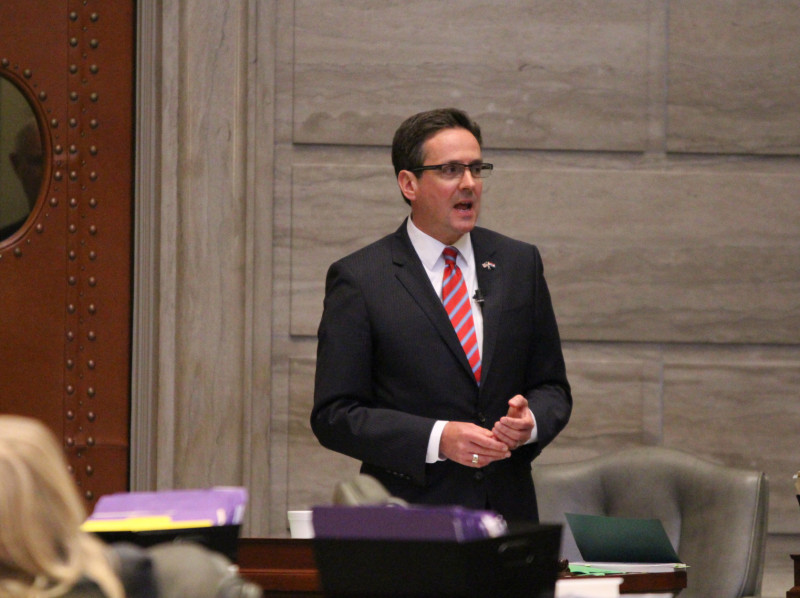JEFFERSON CITY, Mo. – It took the Missouri Senate just one long Thursday session to pass along most of the FY 2017 state budget with few changes after the Senate Appropriations Committee process. Senate President Pro Tem Ron Richard, R-Joplin, said the process was fairly painless.
“It went relatively well. People have their own ideas of how money should be spent, and that’s okay,” Richard said. “It meant the amendments were taken, they were voted on, and I don’t think anyone got upset. Sometimes you win, sometimes you lose… Some of our guys lost, some of the other side lost.”
The biggest fight of the day came over HB 2011, funding for the Department of Social Services, which oversees welfare and Medicaid. Schaefer has long expressed his displeasure with Missouri’s dependency on the federal government when it comes to Medicaid funding, which has gotten progressively more expensive, 34 percent more expensive, in recent years.
“It’s like an abusive relationship,” he said. “I will not be an enabler of this process.”
Schaefer also likened the “out-of-control” funding on Medicaid as a speeding train that needed to be slowed down. The additional funding for the Medicaid cost-to-continue in the budget is over $262 million – with almost $100 million coming out of general revenue.
The bill would also provide more than $12 million in services for children with autism and $7.2 million for the Children’s Division Child Welfare Program.
Sen. Jill Schupp, D-St. Louis, offered an ultimately unsuccessful amendment that would have removed the language barring state Medicaid money from funding organizations that provided abortions, like Planned Parenthood.
“We are going to prevent low income women who need access to inexpensive health care services that is best provided by Planned Parenthood,” Schupp said. “You are going to keep low income women from getting the care they need.”
Schaefer said the taxpayers had spoken and that they agreed with him.
“They don’t want their money going to Planned Parenthood anymore,” he said.
Sen. Rob Schaaf, R-St. Joseph, also offered an amendment that would remove the extension on managed care, arguing that managed care does not actually save money for the state and provides worse quality for health care consumers.
“In my heart, the first reason would be because it hurts people,” Schaaf said. “It hurts all of those moms and kids in the outstate area, they would have to navigate the managed care system that is restrictive.”
Only fellow physician Dr. Bob Onder, R-St. Charles, stood with him in a standing vote.
Debate went smoothly for most of the other bills, with substantial conversation coming only during HB 2002 and 2003, the two bills that fund education in the state.
Schaefer took the opportunity of talking on higher education to highlight that the Senate had taken the governor’s recommendation on funding state universities with a six percent increase instead of the two percent increase recommended by the House. That increase would also take away all funding from the University of Missouri system. The bill would also allot $750,000 to fund the University of Missouri System Review Commission and take away $1 million of funding from the UM System Administration. That commission, he argued, would instill a sense of accountability without drastic measures.
“[It’s] the distinction between supporting the institution and the good things it does for the state of Missouri and not necessarily blindly supporting those that are making decisions in the institution,” Schaefer said. “How do you get your message out there without hurting students?”
Schaefer also noted that he expected pushback from the House on his decision to restore funding to the University of Missouri system after their substantial cuts.
The debate even went back to funding when Schupp expressed concerns that the Foundation Formula was not being fully funded.
Schaefer said that high health care costs affected education funding.
“We should provide services to those that are most in need, but at what point does the seesaw go so far over to one thing you are doing to just fund that health care for those that can’t afford it,” he said.

“We’re spending more than we ever have on education, we can’t get an iota of change when it comes to education reform in this state,” he said. “We have spent years on education reform. I find it interesting the same people that want to spend the maximum of education, you can’t have a kid go to a school closer because it’s going to destroy the fabric of education in the state.”
The only amendment that made it onto the bill from the floor came from Sen. Maria Chappelle-Nadal, D-St. Louis, that would ensure mental health care services for those afflicted by natural disasters.
The process went smoothly aside from that, but Schaefer mentioned it was a far cry from a 45-minute budget session that occurred a few years ago. He also expressed his displeasure with the governor’s continued withholding of funds. Schaefer highlighted a conversation he had with a Nixon staff when he first became budget chair that he believes explains why Nixon would withhold funds.
“He told me when the state doesn’t have enough money, the governor is in control,” Schaefer said. “If the state has more than enough money the legislature is in control because we can add spending lines. And that’s absolutely true… The only way the governor can maintain control is to make it look like we don’t have enough money.”
The Senate still needs to pass the final appropriations bill on real estate before sending the Senate substitutes back to the House.








